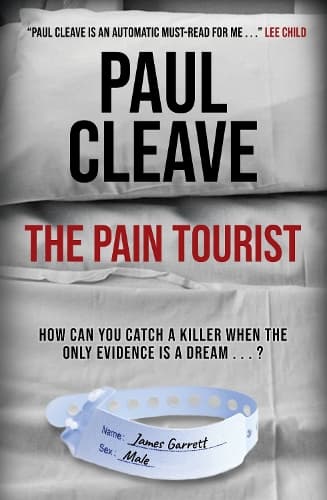Review: The Pain Tourist
Reviewed by Greg Fleming
Although he’s a three-time winner of our Ngaio Marsh award, Christchurch’s Paul Cleave is probably still better known internationally than he is here. His books have been translated into 20 languages and, especially in Europe, where he lives part-time, he has a large and dedicated fanbase.
Let’s hope the publication of this Christchurch-set thriller changes that. It has many of the Cleave trademarks fans have come to love: flashes of violence, a twist-laden narrative and elements of the supernatural a la Stephen King. Pain tourists are “people who revel in the misery of others” - and that’s an understatement. The book opens on a brutal, if botched, home invasion (a typo means that the killers have the wrong address) which puts a young boy into a coma and the intruders killing both his parents.
Nine years later, to the medical team’s surprise, the young man wakes up. However, the celebrations are short-lived as he finds himself targeted by those same killers who consider both him and his sister, who escaped the initial attack, “loose ends.” As he recovers the boy begins writing a series of notebooks from what he calls “coma world” - a world that combines overheard and imagined events and casts renewed suspicion on another, unrelated, crime.
Yes, there’s a lot going on here - multiple story lines, elements of supernatural, a gritty procedural, complicated characters, too many tragedies to mention and more than one serial killer (Joe Middleton, nickname the Christchurch Carver, gets a copycat killer who the media dub Copy Joe.)
Cleave, like Jacqueline Bublitz in Before You Knew My Name, also confronts the thorny question of our deification of murderers. The more twisted they are the more they seem to appeal to the popular imagination while little thought is given to the victims.
‘Every second TV show is a true-life documentary of [somebody being murdered],’ says one character, whose wife was a victim of the Carver. ‘I don’t know what Angela’s last-ever thought was as she was dying, but I sure as hell know it wasn’t hoping folks would package pieces of her life into entertainment.’
Despite the grisly narrative Cleave keeps things moving at pace and the violence is implied rather than dwelled upon; Cleave clearly aware that crime writers could easily fall victim to accusations of “pain tourism” themselves. A similar theme was explored, perhaps less successfully, in Cleave’s last book The Quiet People while this book’s ending suggests it’s a dilemma he continues to wrestle with in his creative life.
But there are lighter moments; Cleave has some meta-fictional fun with one character working in an advisory role on a film production of his own debut novel The Cleaner (which really is in production in Christchurch, funded by the same company that made Mad Men and The Walking Dead).
That might all sound like too much to cram into a 300-page novel but not with a writer as skilled as Cleave at the helm. He keeps the narrative digestible, using chapters to jump from character to character, deftly moving between timelines both real and imagined.
As Cleave puts it in this book’s acknowledgements “making bad things happen” is his pièce de résistance and, by that measure, this is an unqualified success. Indeed, 2022 has been a year rich for locally penned thrillers with Simon Lendrum’s The Slow Roll, J.P Pomare’s The Wrong Woman and Michael Bennett’s Better the Blood among them and, just in time for Christmas, add The Pain Tourist to that list.
Reviewed by Greg Fleming
